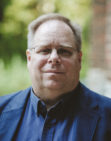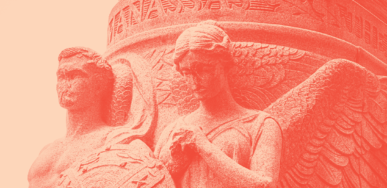
[00:00:00] Martien Halvorson-Taylor I'm Martien Halverson Taylor.
[00:00:03] Kurtis Schaeffer And I'm Kurtis Schaeffer.
[00:00:05] Martien Halvorson-Taylor We're hard at work on season three of our show, it's going to cover a lot of things, including America's first best selling female author, how the translation of a single word can affect how we understand the Bible and how religions shape responses to climate change.
[00:00:25] Kurtis Schaeffer But on January six, something happened that we just couldn't ignore.
[00:00:32] Go, go, go.
[00:00:37] newsclips Unnerving and remarkable scenes of chaos on the doorstep of the home of American democracy.
[00:00:44] A violent mob stormed the U.S. Capitol in an attempt to block the certification of Joe Biden's Electoral College victory.
[00:00:51] Kurtis Schaeffer Some in the crowd were calling for the vice president and Democratic lawmakers to be publicly executed in the chaos. Five people died, including a Capitol police officer.
[00:01:03] Martien Halvorson-Taylor Journalists and antifascist activists have traced the identities of dozens of the rioters, tying several to white supremacist groups, including the Proud Boys, Three Percenters and Oath Keepers. Also clearly visible were shirts and signs in support of Q - the supposed government insider at the center of a vast new conspiracy theory, one that views Donald Trump as a savior fighting against satanic forces.
[00:01:56] Kurtis Schaeffer But what stood out to us is that as much as this is a story about online disinformation and the rise of violent white supremacy, it is also very much a story about religion. White evangelical Christians have enthusiastically voted for and supported Trump since the beginning of his campaign in 2015. And so it shouldn't be a surprise that many came to support him in overturning an election he lost by over seven million votes.
[00:02:23] Sarah Posner One of the criminal complaints against someone who stormed the Capitol, this woman, Jenna Ryan, she's been arrested. The criminal complaint against her says that there's video of her on the steps of the Capitol, you know, about to enter the besieged building. And she shouted, Here we are in the name of Jesus.
[00:02:41] Martien Halvorson-Taylor This is reporter Sarah Posner.
[00:02:44] Sarah Posner I'm Sarah Posner. I am a reporting fellow at Type Investigations where I report on the religious right and the far right. And I am the author of Unholy: Why White Evangelicals Worship at the Altar of Donald Trump.
[00:03:00] Martien Halvorson-Taylor We talked to Sarah last year for our episode on why the Persian King Cyrus keeps popping up in modern politics.
[00:03:10] Martien Halvorson-Taylor She says that to understand how white evangelical Christians came to be among the crowd forcing their way into the Capitol, it helps to understand how they became a political force in the first place. And that's a story that begins well before Donald Trump.
[00:03:28] Sarah Posner Yup, it's about a four to five decade long story. You could argue that it's longer than that. But let's just stick to that for the purposes of this podcast.
[00:03:42] So in the late 1970s, in the wake of Watergate, there were a group of right wing Republican activists who were looking to create a new conservative movement, one that wouldn't rely so much on what you might call in the Ivy League, country club, sort of Republican politics.
[00:04:04] They called themselves the new right, and they were looking to organize white working class voters and people that they believed would believe that they had been left behind in the era of civil rights. And they looked specifically to include a religious component to this right wing evangelicals and Catholics in this movement.
[00:04:32] They were led by a man named Paul Weyrich, who is still a revered figure among Republicans and people involved in the conservative movement.
[00:04:43] Mike Pence has talked about the strong influence of a Paul Weyrich in his life.
[00:04:50] He was a very right wing Catholic who was dismayed by Vatican II and knew that he could bring other Catholics on in the wake of Roe v. Wade. He struggled with bringing white evangelicals aboard. They just weren't interested in the abortion issue, but something happened in the mid 1970s that did get them excited. And that was when the IRS began questioning the tax exempt status of private Christian schools that had cropped up in the wake of Brown v. Board of Education.
[00:05:26] And the IRS basically was telling these schools, look, you know, if you're going to have a tax exemption, you can't avoid something that is a policy of the United States government, which is school desegregation. The IRS did revoke the tax exempt status of Bob Jones University, a fundamentalist college in South Carolina, which had a ban on interracial dating on campus. And there was a huge backlash framed around the idea that the government was anti-Christian and was trying to take their their rights away. And that was the issue upon which white evangelicals became involved in the right. This racial backlash goes a long way to explaining why white evangelicals eventually would become Donald Trump's greatest, most reliable voter base.
[00:06:17] Kurtis Schaeffer And Sarah, is that history? Is that a part and parcel of white evangelicals memory now or is that just deep background?
[00:06:27] Sarah Posner It is most definitely part of their memory.
[00:06:30] And you will still hear evangelical activists who were not even born yet when all of that was going on. Talk about the Bob Jones University case. You heard it, especially in the run up to and in the wake of the Supreme Court's 20 15 decision upheld the Hajis, which struck down bans on same sex marriage across the country. And evangelical activists complained that what would happen would be just like what happened in Bob Jones, that the government would violate the religious liberty of evangelical non-profits or colleges or churches by taking away their tax exemption if they opposed same sex marriage. Of course, that didn't happen. But that entire narrative that the government, by imposing or enforcing progressive policies regarding civil rights for others, necessarily is infringing on the rights of Christians.
[00:07:28] Martien Halvorson-Taylor So, Sarah, it sounds like this culture of white grievance is a major part of it, but that it's not the only thing that's drawing the white evangelicals to Trump.
[00:07:37] Let me explain something else that happened over the four decades since white evangelicals played a key role in helping to elect Ronald Reagan in 1980. During that same time period, you saw changes within American evangelicalism that go a long way towards our understanding of why evangelicals themselves and a lot of evangelical iconography and rhetoric ended up in the storming of the Capitol on January six. One of those is televangelism, which really helped perpetuate this sort of, I don't know what to call it, kind of clown show evangelicalism where it was very focused on like proof, texting, taking Bible verses to try to explain current day events without regard to a proper translation or context for that particular Bible verse. And you saw the rise of new religious movements like the New Apostolic Reformation, which holds that there are modern day apostles and prophets who hear from God and that it's their duty to take dominion over cities to help transform cities for Christ. Different movements which preach not only that, you can receive direct revelations from God or God can give you prophecies about events in the real world, but also that you have a role as a spiritual warrior to engage in spiritual warfare not only against satanic forces in the world, but specifically against satanic forces that are against the Christian nation that God intended America to be. It all factors into this stew of Donald Trump was ordained by God. Donald Trump was anointed by God. You should not question God's anointed one's the enemies of Donald Trump or the enemies of America. God intended America to be a Christian nation. And it's your duty as a spiritual warrior to restore that.
[00:09:42] I mean, if you've been marinating in that kind of talk, it's not a huge stretch to then find somebody in the Senate chamber praying to Jesus about overturning the election.
[00:09:58] And I'm not saying that religious leaders organized or told their followers to do that. I'm just saying that I don't think people were taking into account what all this talk of war and spiritual warfare and enemies and demons and what God wants and apocalyptic end times scenarios, all of that. I think that this all has to be factored in to how people reacted and acted on January 6th.
[00:10:29] Martien Halvorson-Taylor So a lot of these things that you've been talking about actually seem to explain why QAnon has has this hold over the political imagination of a certain number of white evangelicals. Can you tell us more about the appeal of QAnon and how it sort of leverages the passions of its followers?
[00:10:53] Sarah Posner I'm glad that you put it that way, that it leverages the passions of its followers, because it seems pretty evident to me the more I looked at QAnon and the more I thought that whoever Q is or a group of people that is purporting to be Q, that they seemed very familiar with how to stoke existing anxieties of white evangelicals. The reason for that is that evangelicals have been marinating in the sorts of narratives and conspiracy theories that make them susceptible to believing a conspiracy theory. So obviously since the days of the Schofield Bible, they've been talking about the end times, but also more in the political rather than theological realm. They've been suffused with anti-government rhetoric like so. For example, the whole Bob Jones history that we talked about a little while ago is an anti-government story. The government is anti Christian and they've also been marinating in the language of spiritual warfare that they need to engage in spiritual battles against the demonic enemies of America. And a lot of the conspiracy theories that permeate Kuhnen that the government is actually run by these deep state satanic child abusing sex traffickers, find their roots in the satanic panics of the 80s. A lot of the conspiracy theories about the Clintons during Bill Clinton's presidency...Jerry Falwell Sr. disseminated conspiracy videos about the Clintons through his his church and his television program, the old time gospel hour. So the evangelical world was primed for this, particularly when you combine it with their worship of Donald Trump. So the idea that there was this deep state, who is out to get God's anointed president, they were just incredibly susceptible to that. And so in the capital on on on the 6th, you saw that in the the the man who's now been known as the "QAnon shamen" wearing the horns and the fur and the tattoos.
[00:13:12] And he's well known as a as a QAnon proponent -he was in the Senate chamber, we saw from that video that was released by The New Yorker - praying to Jesus.
[00:13:23] Kurtis Schaeffer I find that so fascinating because Trump's recent rhetoric doesn't strike me as playing to evangelicals in in an overt way. If you look at the the speech that he gave, there's really no God until the very end. And it's just kind of a God bless you at the end. But really, it's about this cultivating, this sense of of being wronged. That's paramount in the speech.
[00:13:50] Martien Halvorson-Taylor I mean, it seemed a little bit like a more secular version of the religious lost cause narrative. That sense of being a victim, that sense of being marginalized, that sense of being oppressed, that is more potent when it's attached to figures like Jesus or Christian martyrs.
[00:14:12] Sarah Posner Well, Trump himself did not invoke prayer or God or Jesus, but there were others at that rally who did, including Paul White is his personal pastor and spiritual adviser. Trump knows that kind of persecution rhetoric plays well with evangelicals for all of the reasons that we're talking about right now. These are the reasons why white evangelicals support Trump. They believe that he is pushing back and saving them from the political correctness which has sought to marginalize white Christians or to restrict their free speech or religious freedom. He does not have to invoke God or Jesus in a speech like that because his base reacts to that sense of persecution. And he knows that they see him as the savior from that persecution.
[00:15:13] Martien Halvorson-Taylor As we've been talking about this, what we're facing is not simply a civic political problem, but it's a deeply theological one. And I wonder if there are leaders, institutions. Thinking about how to address this as a theological.
[00:15:35] Sarah Posner Problem, well, yes, I do think that there are Russell Moore, who is the head of the Ethics and Religious Liberty Commission at the Southern Baptist Convention. He's been an outspoken critic of Trump since twenty fifteen and has indeed been ostracized and marginalized by his fellow evangelicals over it. He put out a very scathing statement after January 6th, and it had a lot of theology in it. So that's one person I know. People in seminaries are already starting to talk about this, but.
[00:16:12] The problem is the genie is kind of out of the bottle in the sense of this being like kind of a pop culture movement more than a religious movement, it's like a popular culture insurrection infused with the religious rhetoric that has been blaring out of the religious media and social media for decades. Right. And so when you think about that way, it's really hard to put that theological genie back in the bottle, especially because a huge part of what they've been suffused with is the idea that they, as a follower of Jesus, as a saved individual, are equipped to receive direct revelation from God that they are entitled to use to contradict facts and reality in the real world.
[00:16:59] So it's going to be a very long process. This is not something that is going to happen because a few theologians or Bible scholars want something to change.
[00:17:21] Kurtis Schaeffer Sacred and profane was produced for the Religion, Race and Democracy Lab at the University of Virginia. Our senior producer is Emily Gadek. Our program manager is Ashley Duffalo. Kelly Jones is the lab's editor. Today's guest was Sarah Posner, author of Unholy: Why White Evangelicals Worship at the Altar of Donald Trump.
[00:17:42] Martien Halvorson-Taylor Music for this episode comes from Blue Dot Sessions. You can find out more about our work at Religion Lab Dot Virginia DOT to you or by following us on Twitter at the religion lab.
We’ll be returning with a third season soon. But we couldn’t ignore the biggest story about religion in 2021—the pro-Trump mob that stormed the U.S. Capitol hoping to overturn a democratic election. Journalist and author Sarah Posner joins us and charts decades of racist, anti-government rhetoric and conspiracy theories from the religious right to explain how white evangelical Christians came to be a key part of the violent mob on January 6th.
How to cite this episode:
Halvorson-Taylor, M., Schaeffer K. (Presenters), Posner, S. (Guest), & Gadek, E. (Producer), “Render Unto Q.” Sacred & Profane (2021, Jan 28).
Additional Reading
Dias, Elizabeth and Ruth Graham. “How White Evangelical Christians Fused With Trump Extremism.” The New York Times. January 11, 2021 (Last modified January 19, 2021). https://www.nytimes.com/2021/01/11/us/how-white-evangelical-christians-fused-with-trump-extremism.html (accessed January 28, 2021).
Ebin, Chelsea. “Paul Weyrich: The Religious Roots of a New Right Radical.” American Catholic Studies 131, no. 3 (2020): 29-56.
Lewis, Camille Kaminski. Romancing the Difference : Kenneth Burke, Bob Jones University, and the Rhetoric of Religious Fundamentalism. Waco: Baylor University Press, 2007.
Letson, A. (Presenter), Posner, S. (Guest), Jones, C. and Kamat, A. (Reporters), & Montgomery, M., Aminy, N., Shogren, E., Harland-Dunaway, C., and Jones, J. (Producers), “A transfer of power.” Reveal (2021, Jan 23).
Mogelson, Luke. “The Storm,” The New Yorker 96, no. 45 (2021): 32–53.
Montenaro, Domenico. “How One of the Darkest Days in American History Unfolded.” NPR. Charlottesville, VA: WVTF, January 7, 2021. https://www.npr.org/2021/01/07/954384999/timeline-how-one-of-the-darkest-days-in-american-history-unfolded (accessed January 28, 2021).
Posner, Sarah. Unholy: Why White Evangelicals Worship at the Altar of Donald Trump. Random House, May 26, 2020.
Additional Credits
(Top banner)
Pro-Trump supporters storm the U.S. Capitol following a rally with President Donald Trump on January 6, 2021 in Washington, DC. Trump supporters gathered in the nation’s capital to protest the ratification of President-elect Joe Biden’s Electoral College victory over President Trump in the 2020 election. Photo by Samuel Corum/Stringer via Getty Images.





